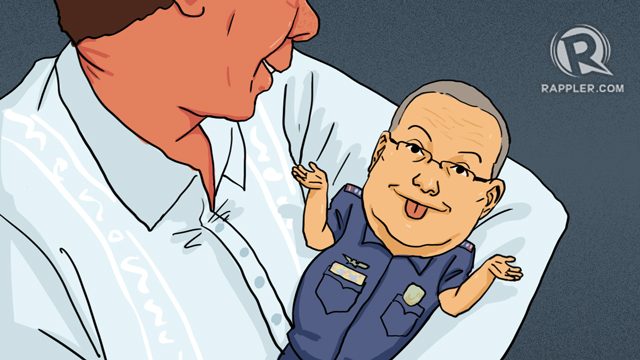SUMMARY
This is AI generated summarization, which may have errors. For context, always refer to the full article.
![[Newspoint] The other Marcos phenomenon](https://www.rappler.com/tachyon/r3-assets/612F469A6EA84F6BAE882D2B94A4B421/img/C66CFE66E35C4292B52A3E5BDCADF9ED/vergel-santos-headshot-150px_f6aa7644af0b4f3087937c91855b88cc.jpg)
Rare fresh air blows from the Senate carrying nonpartisan denunciations of the Duterte regime’s fair-haired-boy treatment of a police superintendent accused in the killing of a town mayor while confined in jail.
The phenomenon revives, if only for the moment, a tradition of independent-mindedness among senators, something seen as having to do with their being elected by national vote. The Lower House of Congress, being made up of district delegates, has not developed a similar tradition, and no Lower House is more patronage-driven and submissive to the president than the present one.
Duterte would in fact have been dealt his first defeat in a senatorial vote if he had insisted on testing the Senate with his pet bill reinstituting the death penalty after it had passed the House easily. He retreated by withdrawing the bill, to fight another day.
Surely a case or two of dissent from Duterte do not an independent Senate make, but, under a draconian presidency like his, one takes consolation where one finds it — it is probably even healthy psychologically. And, given that the issues on which the senators have banded together are deeply moral ones, their one-mindedness may even be sincere, perhaps sincere enough to deserve betting hopes on.
The other Marcos
The current issue involves a former chief of the Criminal Investigation and Detection Group (CIDG) in Eastern Visayas — Superintendent Marvin Marcos. Nothing shows that he is related to the late dictator Ferdinand Marcos, such that he might be favored by Duterte, who professedly idolizes Marcos and counts his heirs among his special political allies and big election financiers. If Duterte favors Marvin Marcos at all it should be because he has given his word to protect and defend — his policemen.
There’s scarce doubt in fact that Marcos is favored: his may well be the most egregious case for a policeman, yet it’s the quickest to be dismissed. He has been returned to his old job, rehabilitated after a brief canning. The police chief, General Ronald de la Rosa, has given a most practical reason, though practical only on the face of it: “Sayang, walang ginagawa, sumusweldo.” He’s being paid doing nothing, after all. And what do we suppose he will do next?
On November 5 last year, in any case, here’s what he did: He leads 18 of his men to the jailhouse of Baybay town, in Leyte province, arriving there before dawn; he tells the jail guards on duty to make themselves scarce and leaves an inmate dead.
The inmate was Rolando Espinosa Sr, mayor of Albuera town, also in Leyte. On the floor of his cell, next to his body is a gun. It is the gun he managed by some trick of concealment to keep on him, while in jail, and use against Marcos and his men, provoking them to shoot back, according to Marcos anyway.

The National Bureau of Investigation called the killing a “rubout”. How, indeed, could Marvin Marcos have got off on such a tale, one made even more suspicious by allegations that he took protection money from Espinosa’s son, a confessed drug dealer? Espinosa was in jail precisely on suspicion of being in collusion with his son.
Implausible tales in fact surround many of the killings happening around, of which more than 7,000 have happened to suspects in the drug trade, mostly people who obviously did not become rich from it, only drugged. The most worn-out part of these tales is told in a word: Nanlaban — the suspect fought back.
Easy deals
Also, according to de la Rosa, who likes to quibble, not all those 7,000-plus were victims of Duterte’s war against drugs. He pins most of the deaths on vigilantes, referring to assassins operating on their own, as if driven by different inspirations or purposes. Thus, he promotes the illogic that what is official is “judicial” and what is unofficial “extrajudicial”.
One case that decidedly proves the proposition ludicrous happened on the island of Mindoro and involved a town police chief. He wore a woman’s wig and, riding behind a motorcycle driver, shot his target dead. He has been positively identified but seems to have disappeared.
Similarly conspicuous in its recession into obscurity is a gang of policemen, whose case rivals that of Marcos in impunity. They were exposed on camera in a drug session in Antipolo City, in Metro Manila, with a couple suspected to be their own drug runners and found dead the next day.
Why do Marcos and others in his infamous league get easy deals from the Duterte regime? The question inevitably recalls the cases of Edgar Matobato and Arthur Lascanãs, whistleblowers who lost their protection insurance and have gone into hiding after confessing as assassins for a death squad in Davao City during Duterte’s mayoralty there.
That may not be the case with Marcos and the others, but it’s certainly a more logical proposition than the one de la Rosa offers or the tale Marcos tells. – Rappler.com
Add a comment
How does this make you feel?
There are no comments yet. Add your comment to start the conversation.